Podcast
Questions and Answers
Which of the following is an example of hyperbole?
Which of the following is an example of hyperbole?
- The silence was a roaring beast.
- I'm so hungry, I could eat a horse! (correct)
- O, Death, be not proud!
- The wind whispered through the trees.
Which of the following is an example of assonance?
Which of the following is an example of assonance?
- The rain in Spain falls mainly on the plain.
- She sells seashells by the seashore.
- Hear the mellow wedding bells. (correct)
- The cat sat on the mat.
Which of the following is an example of euphemism?
Which of the following is an example of euphemism?
- The sun smiled down on the earth.
- The old man with the broken teeth.
- He kicked the bucket.
- She's vertically challenged. (correct)
What is an apostrophe in literature?
What is an apostrophe in literature?
What is a paradox?
What is a paradox?
Which of the following is an example of a paradox?
Which of the following is an example of a paradox?
Flashcards are hidden until you start studying
Study Notes
Literary Devices
-
Hyperbole: An exaggerated statement not meant to be taken literally, often used for emphasis or humor. Example: "I’m so hungry I could eat a horse."
-
Assonance: The repetition of vowel sounds within nearby words to create rhythm or enhance mood. Example: "Go mow the lawn," where the long "o" sound is repeated.
-
Euphemism: A mild or indirect word or expression used to replace one that may be considered harsh or blunt. Example: "Passed away" instead of "died."
-
Apostrophe: A figure of speech in which a speaker directly addresses someone or something that isn’t present or cannot respond, often used to convey emotion. Example: Addressing a dead person or an abstract idea like love.
-
Paradox: A statement that seems contradictory but may reveal an underlying truth. It challenges the reader’s perspective. Example: "Less is more."
-
Example of a Paradox: "This statement is false." It's self-contradictory yet provokes thought about truth and belief.
Studying That Suits You
Use AI to generate personalized quizzes and flashcards to suit your learning preferences.




